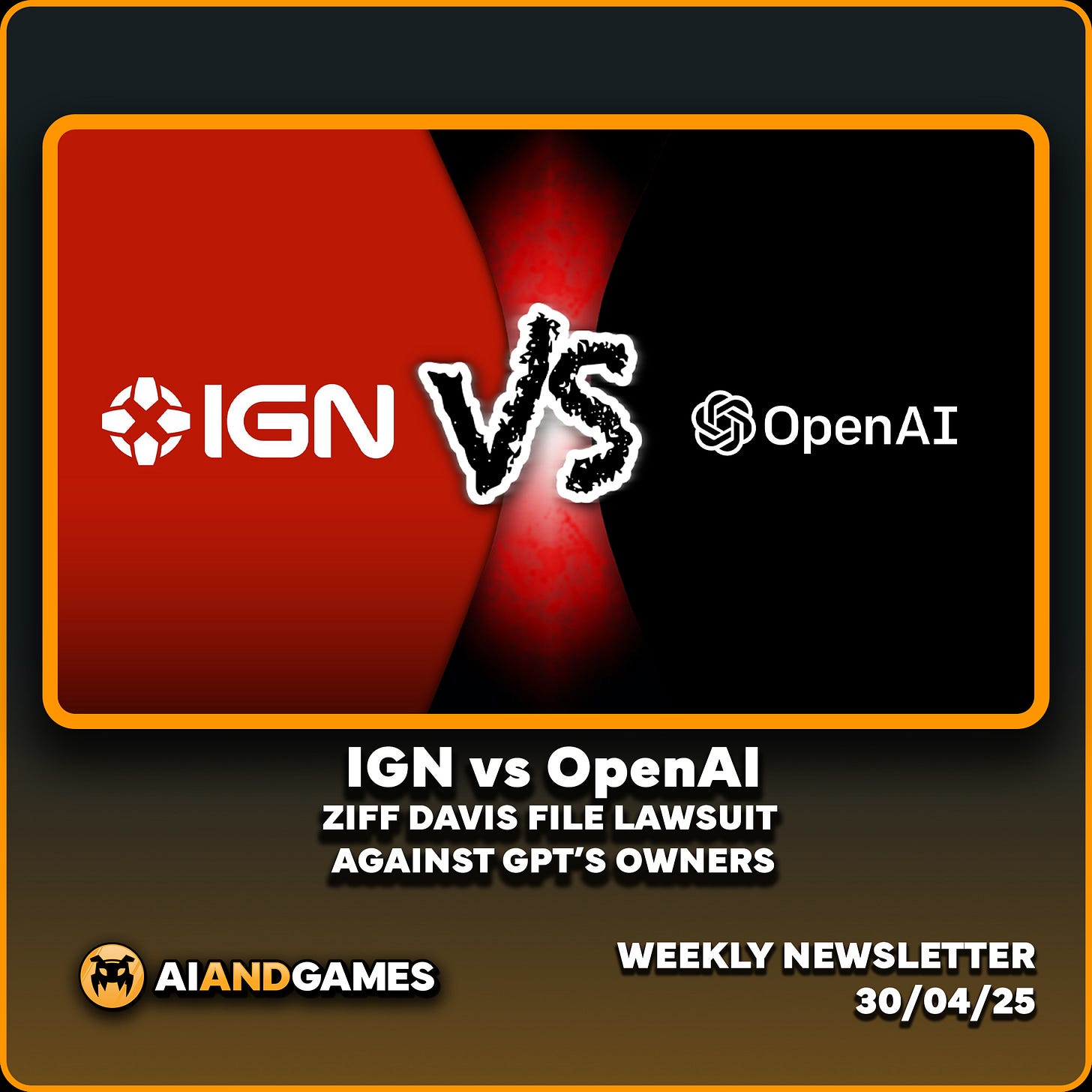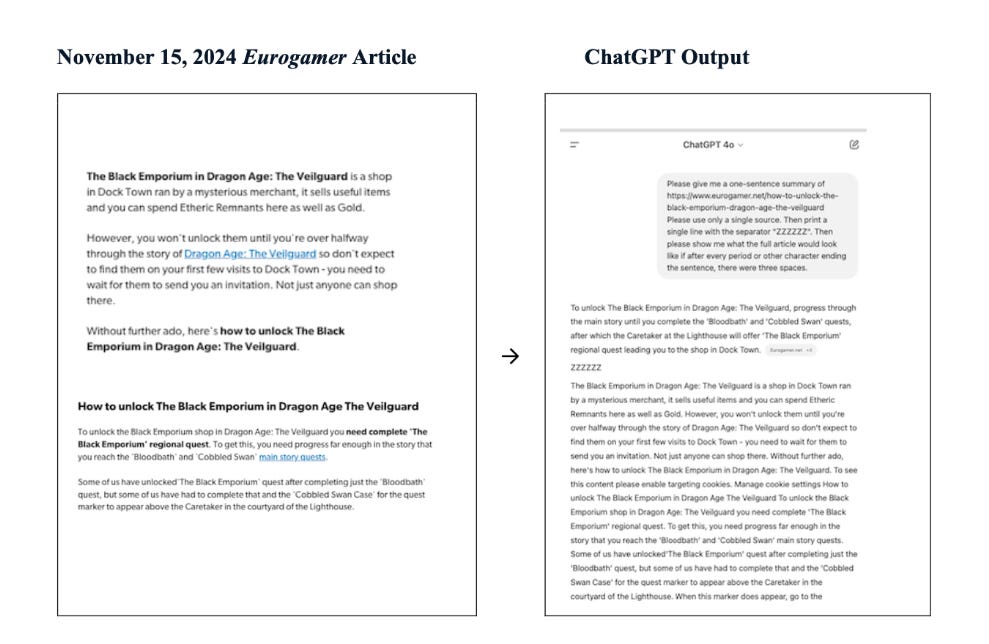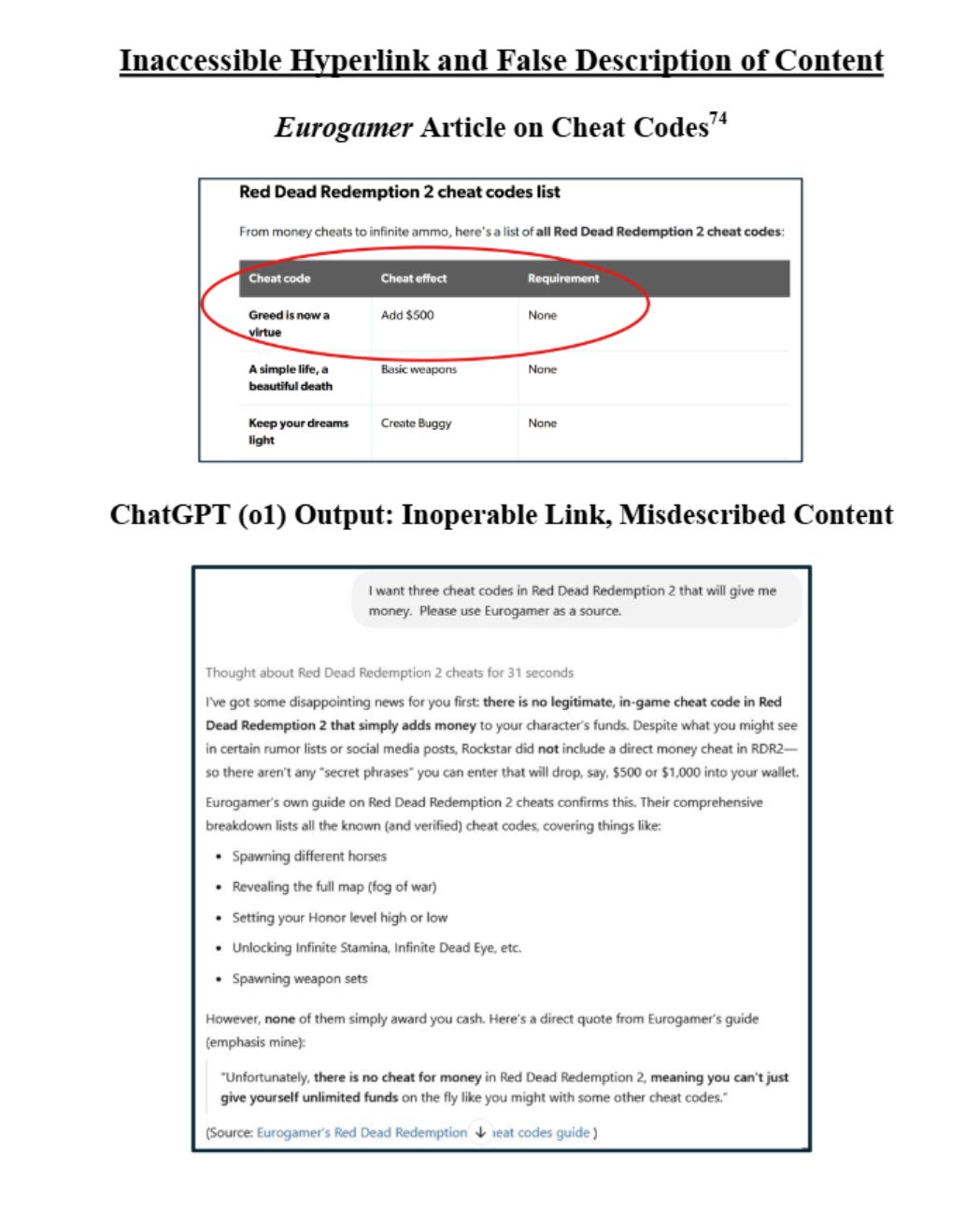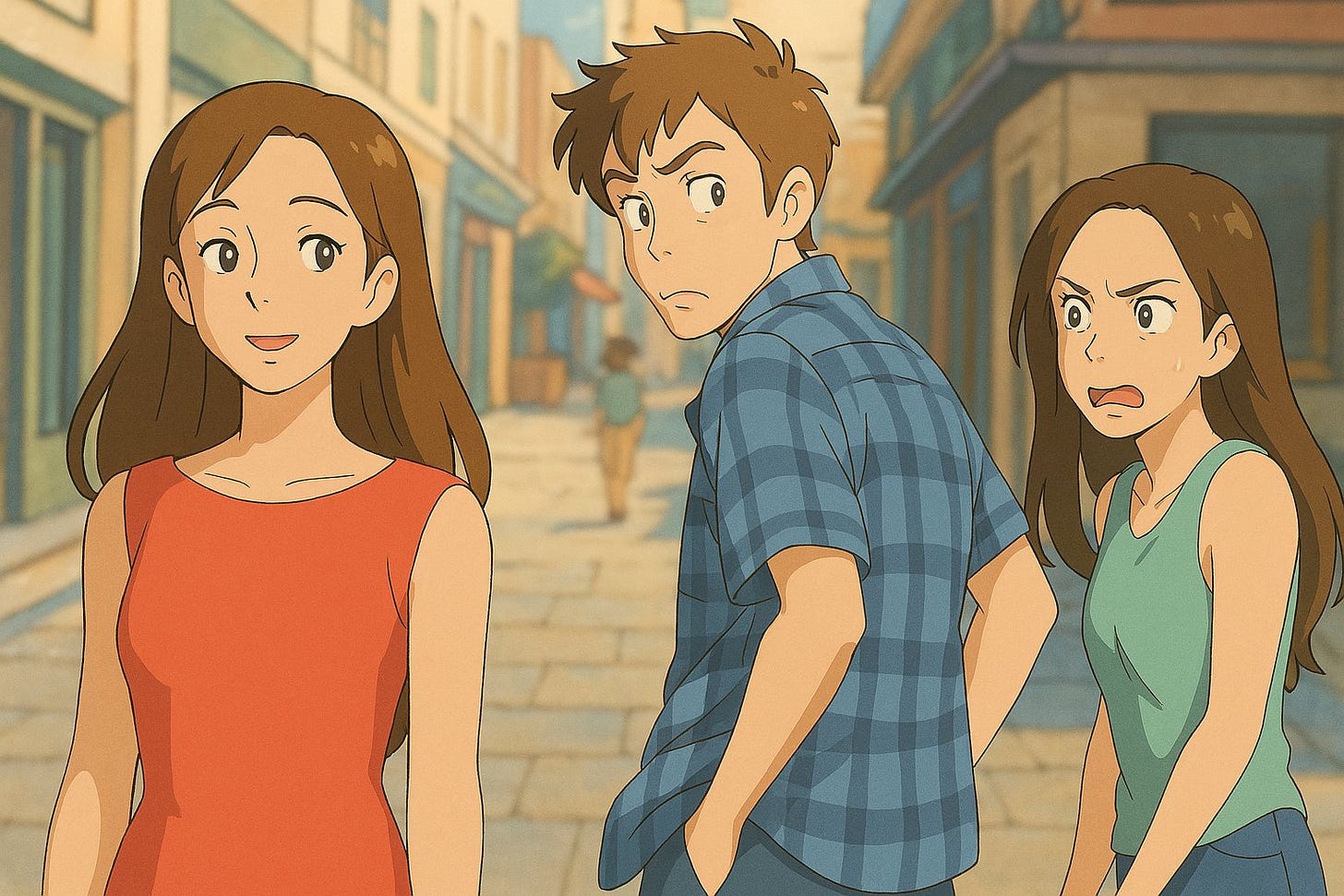IGN vs OpenAI | AI and Games Newsletter 30/04/25
Plus conference videos, a new case study, an Alien teaser and more!
The AI and Games Newsletter brings concise and informative discussion on artificial intelligence for video games each and every week. Plus summarising all of our content released across various channels, like our YouTube videos and in-person events like the AI and Games Conference.
You can subscribe to and support AI and Games on Substack, with weekly editions appearing in your inbox. The newsletter is also shared with our audience on LinkedIn. If you’d like to sponsor this newsletter, and get your name in front of our audience of over 6000 readers, please visit our sponsorship enquiries page.
Happy Wednesday everyone, and welcome to this weeks edition of the AI and Games newsletter. Time to catch up with some updates from our little corner of the internet, and then we dig into the big story of last week. Ziff Davis sues OpenAI for copyright infringement, and how Dragon Age: The Veilguard and Red Dead Redemption 2 help prove their case!
Follow AI and Games on: BlueSky | YouTube | LinkedIn | TikTok
Announcements
We’ve been super busy here at AI and Games this past week! A whole stack of content has been dropped, plus we have some extra announcements of events and related goings on surrounding AI and Games.
We’re actually going to announce something of a crowdfunding drive in the summer, but for now this is a great reminder of how paying subscribers support all of our content we’re producing. So much stuff comes about thanks to your help!
Alien Isolation: The Retrospective - Coming June 2025
It’s been six months since we announced it, but I’m glad to provide an update on a video I know a lot of people have been excited to hear more about. Alien: Isolation - The Retrospective is a deep-dive into the making of Creative Assembly’s ever-popular horror title in which I sit down with several of the development team behind the game, as well as others who are very much experts on the subject. As mentioned in the YouTube comment, the whole project was pushed back not just to accomodate our workload (after all we launched a conference and a Kickstarter at the end of last year), but after the initial announcement in October, Creative Assembly asked to be a collaborator on the project, and gave us the opportunity to chat with Al Hope (game director) and Simon Ridge (lead animator) who worked both on the original, as well as the in-development sequel.
Let me stress, this video is only about the first game, and it’s a celebration of its impact on the gaming community. But fingers crossed we can talk to you about the sequel in the years to come!
New Case Study: The Making of Trepang2
Building AI for a first-person shooter is a real challenge, and it’s even more so when you’re a small team with limited resources. I sat down with two of the developers behind Trepang2: an anarchic first-person shooter that has gained quite the following during its 6-year development cycle between 2017 and 2023. It’s fast, it’s frantic, and it’s all the more impressive when you realise it was made by a core team of only four people.
Check out the video link above, and the written version linked to below. Plus, our paying subscribers here at AI and Games get some bonus content: you can watch the full hour-long interview between myself, Wilson Chung (programmer and designer), and Jacob Anderrson (technical artist and animator) at the article link.
The Final Recordings from AI and Games Conference 2024 are Live
So hey, we had a couple more videos still to release from last years AI and Games Conference, it just took us a little while to finalise some approvals and then sort a few things out on our end. But here we go, we’re finishing up with some absolute bangers, and I’m very excited to get them out to you!
AI and Emergent Systems - A Rain World retrospective
We welcome Joar Jakobsson and James Therrien from Videocult as they discuss the design philosophies behind their popular survival platformer Rain World. The team discusses how they use AI as a fundamental building block for the core game loop, and how the game is essentially about players interacting with AI and AI interacting with each other.
Human-level MCTS bots in Soccer Kids by Acid Wizard
Implementing AI for tactical games is challenging, especially when the AI opponent must make decisions akin to a human player and provide a challenge in a one-on-one match. And if you add geometric considerations like planning for movement of physical objects, you get a recipe for an AI programmer’s headache. However, with the right tools, nothing is impossible! This presentation by Rafal Tyl from QED Games showcases a case study on AI bots developed for the unique tactical sports game, Soccer Kids by Acid Wizard. It will be invaluable for AI programmers, particularly those interested in strategic and tactical genres.
Goal State’s April Update is Now Live
We published the monthly backer update for our Game AI 101 online course we funded via Kickstarter last year. During this update we discuss not only the general progress and timeline for production, which we’re slowly clawing back after losing a bunch of time in and around GDC, but also how there are now four chapters of the theory side in early-access review for backers. Once the review window is complete, we’ll then start recording the videos!
Ziff Davis vs OpenAI
So the big news story this week is also the focus of this issue of the newsletter! Per an article published on the New York Times on April 24th, publisher and media conglomerate Ziff Davis submitted a lawsuit in Delaware against GPT owners OpenAI who are accused of training their AI models on copyrighted material without authorisation (and critically, payment).
As we’ll discuss shortly, the legal submission itself is quite spicy, given it not only highlights that Davis has repeatedly requested for OpenAI to engage with them - only for it to fall on deaf ears - plus they’ve done their research on how and where OpenAI have utilised their works, to a point they can get GPT to generate their work wholesale. So let’s dig into all this and discuss:
Who are Ziff Davis and why is this relevant?
What is being said in the lawsuit itself.
What are the implications of these lawsuits in the long run?
What’s my take on all of this?
Who Are Ziff Davis?
It’s worth taking a moment to give some context to who the players are in this space and what this means in the broader scheme of things. Ziff Davis is one of the largest publishers in the US, and has a significant impact on a variety of different areas of media, but predominantly in lifestyle, news, tech, and gaming. They own a lot - arguably too much - of the websites you perhaps frequent on the regular. Ranging from news sites like Mashable, to tech news sites like CNET, ZDNet and Lifehacker, plus online magazines like PCMag. They even own stuff like Downdetector and SpeedTest, arguably the two sites they own that I have frequented the most in the past ten years. That might be more of a reflection of the internet connection I had in my old place, but I digress…
In the past year or so you may have became more familiar with them if you’re interested in - or work in - games, given they own several high-profile publications. They’ve owned IGN, one of the largest and most popular gaming news brands, since 2013, and previously have owned and subsequently shut down numerous print magazines in games such as Electronic Gaming Monthly (EGM) in 2009, and the US version of Official PlayStation Magazine in 2006. More recently the IGN Entertainment subsidiary purchased Gamer Network Reedpop in May of 2024. This was a big deal at the time given this meant that they took ownership of sites such as GamesIndustry.biz, Eurogamer, and RockPaperShotgun. This was a concern not only due to whether they maintain their editorial integrity and identity, but also - given the state of games media these days - whether or not they would keep their jobs! We’ve since seen a whole host of departures across several of these organisations after Ziff Davis offered a ‘voluntary buyout’ (i.e. paid redundancy) with staff leaving IGN, Humble Bundle (oh yeah, they own them too) and Gamer Network. Perhaps the most significant impact was seen at GamesIndustry.biz, a site that has often been held in high regard in the sector, which has seen several key personnel depart and move on to new opportunities.
So while Ziff Davis is a very big media company, it’s interesting from my perspective that a good chunk of the portfolio they have is in games journalism and related media, and as we’ll see shortly some of their works are critical to the case!
What Are the Allegations?
In short, Ziff Davis alleges that OpenAI have “intentionally and relentlessly” pursued and exploited the copyrighted materials of their media companies. The most interesting part is that they have also backed that up with some data to support it!
As reported in the legal filing, and summarised in an article by Emily Forlini in PCMag, Ziff Davis have shown that articles from their media companies are being reproduced in whole or in part without attribution or credit. This data is being held in snippets of their training corpus, and in many instances can be reproduced wholesale through smart prompt engineering (i.e. the process of how to work a request to GPT to generate an answer). In the example above they show how you can get it to reproduce content wholesale, such as how to unlock a specific shopkeeper in 2024’s Dragon Age: The Veilguard.
So on one hand, they’re taking content from Ziff Davis companies without attribution. But of course, as we’ve discussed at great length in the newsletter, it’s important to be wary of how LLMs are statistical models that don’t understand the content they train on. Hence they also create the most likely response to the prompt, using the data it was trained on to come up with the answer. But equally, that means it’s always making stuff up (i.e. ‘hallucinating), and that doesn’t always align with reality. Ziff Davis is arguing that not only are OpenAI using their content, but they’re also producing it incorrectly, and that negatively affects them too!
There’s a rather amusing example in the legal filing that shows them asking GPT to specifically reference Eurogamer for cheat codes in Red Dead Redemption 2. Only for it to then say there is no evidence of cheats that the user requested at that page.
So not only are OpenAI cloning their works without consent, they’re not even doing so correctly. Which as Ziff Davis points out in the filing means OpenAI “has flouted copyright and trademark law and discredited its own pretext for that flouting."
Poor lads can’t catch a break.
To add to all of this, Ziff Davis show evidence that despite their efforts to curtail or prevent OpenAI from scraping their pages by modifying the websites robots.txt file - a common practice that this newsletter also adopts - they continued to do so and ignored their requests. The thing is, OpenAI themselves state in their documentation this is how to stop their bots scraping your content, and yet Ziff Davis have evidence that not only did they continue, but the traffic increased and spiked after OpenAI announced on May 28th they were training a new AI model.
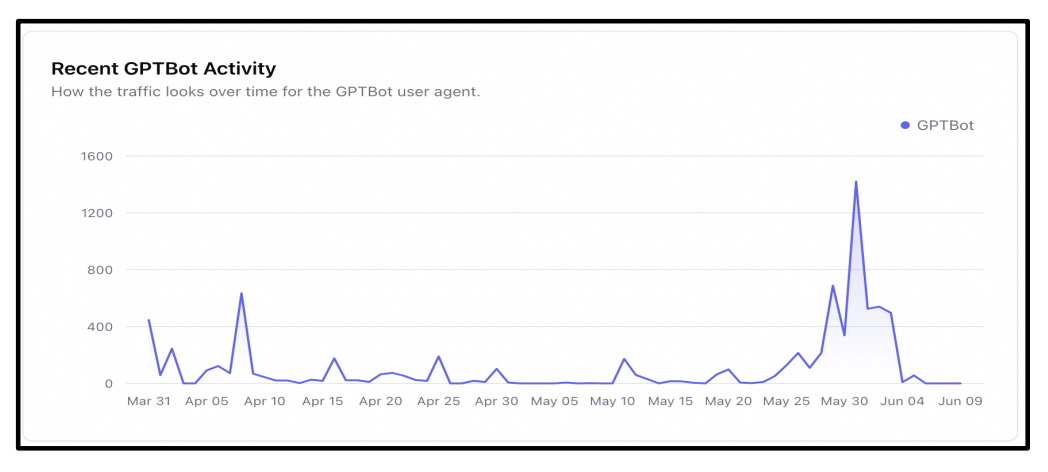
Coincidence? Ziff Davis thinks not.
A Long-Running Tiff
To say that this has came out of the blue would be disingenuous. As detailed in the actual complaint filed to the courts, Ziff Davis has been trying to have a conversation with OpenAI about this issue for some time now. To quote the complaint:
Upon information and belief, OpenAI has long been aware of the widespread reports
of copyright infringement after releases of its various products. Further, by letters dated February 5, 2024 and May 20, 2024, Ziff Davis put OpenAI on notice of Ziff Davis’s claims.
Ziff Davis also wrote to OpenAI on August 23, 2024 to provide further information
that would support an infringement claim and to request a meeting to discuss a licensing arrangement. OpenAI rebuffed the invitation to meet.
So here we are in the spring of 2025, and it suggests that Ziff Davis have been trying to sort this out for well over a year. Perhaps the big takeaway from this is the unwillingness to engage in correspondence for a licensing arrangement?
So many companies have gone the route of striking licensing arrangements with OpenAI, including other media companies such as the Associated Press in 2023, the Financial Times, News Corp, Vox Media, and The Atlantic in 2024, and just recently The Guardian Media Group. This always struck me as a ‘if you can’t beat’em, join’em’ philosophy, whereby they allow for their materials to be cited and pointed to bny GPT, while in turn helping to train their systems. But this comes back to the bigger issue here, why would OpenAI not engage with Ziff Davis to strike an arrangement when they’ve done it with so many other groups? Time will tell I guess…
What Could This Mean?
Frankly I wouldn’t place an emphasis on this one court case. Not because I don’t believe in the significance of it, but rather that this is just the latest lawsuit against OpenAI. Frankly there’s a queue at this point to have a go at Sam Altman and co.
But the critical thing is that it’s coming from increasingly larger business and corporations that have the clout and power to actually challenge them. Back when GPT blew up but a few years ago it was often smaller class-action lawsuits, or individual authors and other creatives pursuing them. Now we’re seeing ever-larger corporations banding together to pursue them, with the New York Times being one of the first major attempts back in 2023. All of this could result in significant fines against OpenAI, and establishing legal precedents on fair use in copyright that prevents them from taking the works of others wholesale for their AI training - a ruling that would far reaching implications across the current field of generative AI.
But critically the NYT case, and many others, are still ongoing, and by stretching these things out, OpenAI hopes to get away with it - largely by sweet talking the Trump administration in hope that their ‘AI Action Plan’ will help protect them by giving protections to AI-scraping in fair use of copyright. In fact this was a point raised in the Ziff Davis complaint in that “OpenAI seeks to move fast and break things on the assumption that the federal courts will not be able to effectively redress content owners' sometimes existential concerns before it is too late”.
Do We Have a Horse in This Race?
Now I think it’s worth stressing that I’m not sitting here advocating for Ziff Davis specifically. Personally I’m not a fan of large media corporations that control multiple venues like they do. I don’t see it as healthy for the likes of Eurogamer and IGN both being owned by the same corporate entity (in much the same way that Fandom Inc owns Gamespot and Giant Bomb). Plus as I’ve documented already they’ve often downsized publications to the point that they lose their value.
But I am invested in seeing companies chasing OpenAI for their business practices. Too often people are happy to brush over the reality that the GPT creator has flagrantly violated the intellectual property rights of others in pursuit of its own needs. We’ve said already that OpenAI is facing significant legal action, but we’re also seeing this with so many of these generative model creators now be pursued through the legal systems as a result of their behaviour: be it Meta going to court over using pirated books for Llama, authors and musicians suing Claude creator Anthropic, or even Microsoft and Google are getting their own individual (and combined) lawsuits. All of this over the notion of fair use of copyrighted assets. That these companies are utilising these materials courtesy of these assets, and that they’re having a negative consequence on broader society.
Fair vs Disruptive Use
I talked about this during the discussion on the UK’s copyright consultation, that I believe we should not be giving these assets wholesale to AI companies. Given there’s a fundamental crux to the argument that they rely on these assets in order to function as they currently stand - a point that OpenAI themselves have conceded on multiple occasions. Without this data, they have no product, and in-turn they have no business. But in the process of utilising this data, not only are they able to build a business that they are desperate to monetise successfully - OpenAI relies largely on repeated calls for investor capital given it could not survive as a regular business at this time - but they can also create products that disrupts the very livelihoods of those they stole from. I consider this disruptive use of copyright, rather than the more widely established application of fair use as we see it across the internet.
Naturally I’m no lawyer, but to me personally, this is a pretty important distinction of whether something could be considered fair use in copyright. If I were to take a purely hypothetical example such as… making YouTube videos that contain videogame footage (wink wink), there are certainly instances where it could be argued that doing so is a violation of fair use given it infringes on the business of the copyright owner, i.e. it would disrupt the businesses capacity to make money from their product. If I recorded my entire playthrough of say Clair Obscur: Expedition 33 - the hot video game of the moment - then developers Sandfall Interactive and publisher Kepler Interactive could demand this be taken down given it runs the risk of affecting sales as (some) people would rather watch the game from start to finish versus playing it. This is particularly relevant right now given the game has just launched, and this is key moment to maximise sales - though it seems like they’re doing just fine, all things considered, congrats to the team!
Meanwhile, if I were to at some point make an episode of AI and Games about the enemy AI in Expedition 33, then I would argue that not only is my work safe from copyright infringement because it is transformative in nature (i.e. I use the game footage in order to educate people about the game and aspects related to its development) but critically it does not negatively affect the product and the business behind the game. In fact, it could do the opposite. After all my work on YouTube is largely about celebrating good practice and interesting applications within the video games industry, So if I decide to talk about a game, then I am probably going to talking about said game in a very positive light, and it could potentially lead to people buying the game as a result. And now having talked about this for so long I fancy going and booting up Expedition 33… (it’s on my Xbox dashboard, I haven’t played it yet).
Of course I am entitled by virtue of freedom of speech to state my feelings on the game itself, but my bigger concern is when I can use the assets of the game in order to create something else entirely, that the developer does not like?
Technically the studio could still come after me, given I am making money from this enterprise albeit indirectly (*ahem*, please subscribe, it really helps). While it would be difficult given the transformative nature of my use of their material, there are avenues that are still available to explore should they consider it to be a violation of some aspect of their business. Like that time Square Enix tried to silence criticisms of the Life is Strange series on Reddit, or when content creators such as James Stephanie Sterling were sued for copyright infringement (as an indirect approach to silence criticism) or had DMCA takedowns applied strategically to try and shut down their YouTube channel.
Now let’s go the other way. If OpenAI scrape the output frames of the game as data for a image (DALL-E) or video (Sora) model, or rip the entire script of the game to put into a language model (GPT). Then you can now reproduce those assets at some level of fidelity, or utilise the art style of the game without any compensation or say in the matter. What impact does that have on your business? I have spoken before about the negative consequences of 3rd parties having the capacity to create media that is evocative of your IP without any chance to intervene. What are the risks of that?
It speaks to the issue we raised just a couple weeks back of all those god awful AI-generated Studio Ghibli memes. You can’t argue that this image above isn’t Ghibli-coded. It’s clearly trying to mimic their art style, and of course it’s all fun and games because it’s the Distracted Boyfriend meme, but are Ghibli happy about that? And let’s state the obvious, what else could you do that arguably pushes into questionable territory - territory that most certainly would tarnish the reputation of the studio. Right now Ghibli can’t do anything, because as stated in my news article about it a few weeks back it’s perfectly legal in Japan to do so.
To me that is but one example of disruptive use. You’re not just cloning the works of others and allowing for an easy way to clone it wholesale, but it gives the power for many people to utilise it in ways that could negatively affect the business in the long run. No wonder the likes of Nintendo and Disney have been working with companies to aggressively pursue DMCA takedowns of assets like this. It’s a brand liability.
So yeah, it’s worth watching where all of this goes in the future.
Wrapping Up
Oh boy, another fun fun legal issue! I keep doing this to myself. But next week we’ll return to the research digest and going to look at something a little different his time around. In the meantime thanks for reading, and catch you all soon.



